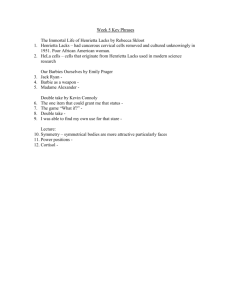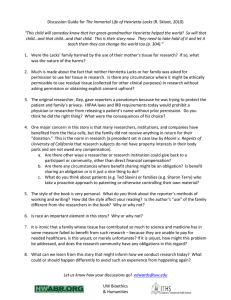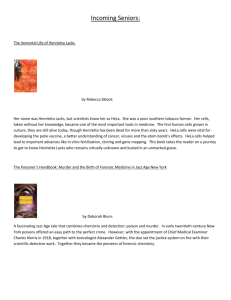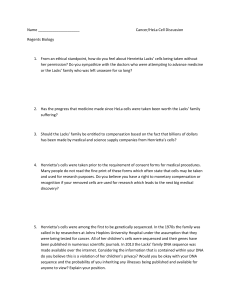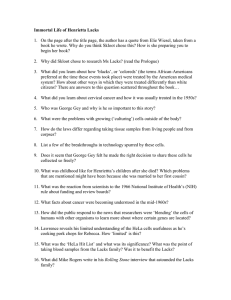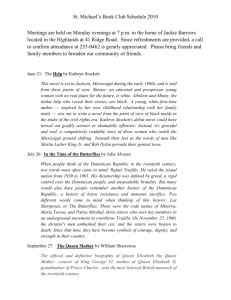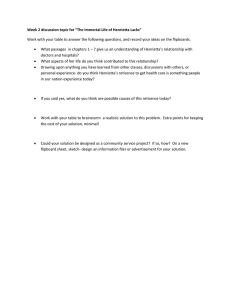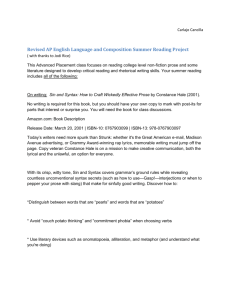How Will We Treat This Generation`s Henrietta
advertisement
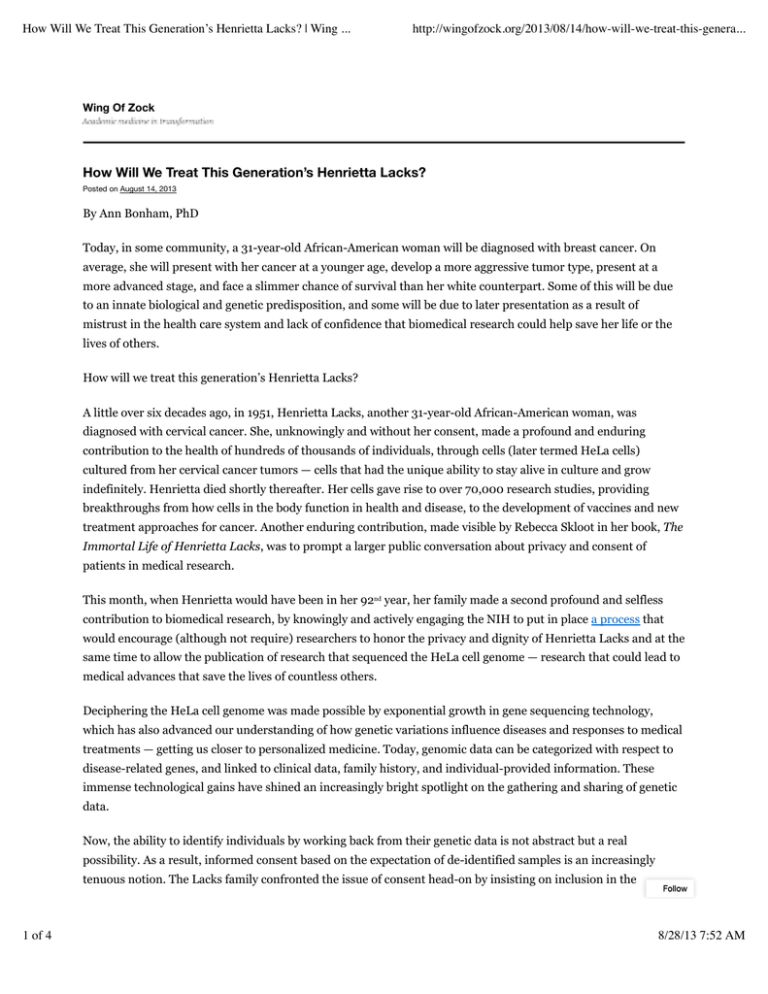
How Will We Treat This Generation’s Henrietta Lacks? | Wing ... http://wingofzock.org/2013/08/14/how-will-we-treat-this-genera... Wing Of Zock How Will We Treat This Generation’s Henrietta Lacks? Posted on August 14, 2013 By Ann Bonham, PhD Today, in some community, a 31-year-old African-American woman will be diagnosed with breast cancer. On average, she will present with her cancer at a younger age, develop a more aggressive tumor type, present at a more advanced stage, and face a slimmer chance of survival than her white counterpart. Some of this will be due to an innate biological and genetic predisposition, and some will be due to later presentation as a result of mistrust in the health care system and lack of confidence that biomedical research could help save her life or the lives of others. How will we treat this generation’s Henrietta Lacks? A little over six decades ago, in 1951, Henrietta Lacks, another 31-year-old African-American woman, was diagnosed with cervical cancer. She, unknowingly and without her consent, made a profound and enduring contribution to the health of hundreds of thousands of individuals, through cells (later termed HeLa cells) cultured from her cervical cancer tumors — cells that had the unique ability to stay alive in culture and grow indefinitely. Henrietta died shortly thereafter. Her cells gave rise to over 70,000 research studies, providing breakthroughs from how cells in the body function in health and disease, to the development of vaccines and new treatment approaches for cancer. Another enduring contribution, made visible by Rebecca Skloot in her book, The Immortal Life of Henrietta Lacks, was to prompt a larger public conversation about privacy and consent of patients in medical research. This month, when Henrietta would have been in her 92nd year, her family made a second profound and selfless contribution to biomedical research, by knowingly and actively engaging the NIH to put in place a process that would encourage (although not require) researchers to honor the privacy and dignity of Henrietta Lacks and at the same time to allow the publication of research that sequenced the HeLa cell genome — research that could lead to medical advances that save the lives of countless others. Deciphering the HeLa cell genome was made possible by exponential growth in gene sequencing technology, which has also advanced our understanding of how genetic variations influence diseases and responses to medical treatments — getting us closer to personalized medicine. Today, genomic data can be categorized with respect to disease-related genes, and linked to clinical data, family history, and individual-provided information. These immense technological gains have shined an increasingly bright spotlight on the gathering and sharing of genetic data. Now, the ability to identify individuals by working back from their genetic data is not abstract but a real possibility. As a result, informed consent based on the expectation of de-identified samples is an increasingly tenuous notion. The Lacks family confronted the issue of consent head-on by insisting on inclusion in the 1 of 4 Follow 8/28/13 7:52 AM How Will We Treat This Generation’s Henrietta Lacks? | Wing ... http://wingofzock.org/2013/08/14/how-will-we-treat-this-genera... scientific process, and the result is the newly formed HeLa Genome Data Access working group at the NIH, on which two members of the Lacks family will serve. The group will review requests for access to whole-genome HeLa cell data deposited in an NIH database for medical research, and help ensure that any resulting publications using the data will recognize Henrietta Lacks and her descendants. The story of Henrietta Lacks and her family is playing out at the intersection of a handful of the most charged issues in health care and biomedical research today: the struggle for policies to keep pace with technological change while protecting the safety and privacy of human participants in research the heightened privacy concerns specific to research with genetic data the desire to make basic and clinical research studies more representative and inclusive, in the face of continued, historically warranted wariness of minorities, including African-Americans, to participate in research in general and in genetic research in particular the unequal distribution of the benefits of research, paired with the disproportionate burden of disease on African-Americans and other minorities, both by under-explored molecular differences and societal and environmental inequities. Henrietta Lacks unwittingly became part of the medical research ecosystem in 1951 and has since been embraced as the “face” of the movement to rework research consent and privacy considerations. Her story continues to inspire passionate discourse on the appropriate and ethical treatment of individuals by the health care system and medical research. Her family has done its part by advancing biomedical research in a way that preserves the consent, privacy, and dignity of Henrietta Lacks and her family. Now it is time for us to do our part. Can we stand on the shoulders of Henrietta Lacks and her family to actively answer the concerns about genetic discrimination; resolve this legacy of mistrust, abuse, and exclusion; and grapple with the concerns about privacy, so that a 31-year-old African-American woman with breast cancer in 2013 will have the same benefits of major medical findings from research — genomic and otherwise — as her Caucasian counterparts? —Ann Bonham, PhD, is chief scientific officer at the Association of American Medical Colleges. She can be reached at abonham@aamc.org. Share this: Like this: One blogger likes this. This entry was posted in Commentary, Research. Bookmark the permalink. 6 Responses to How Will We Treat This Generation’s Henrietta Lacks? Follow 2 of 4 8/28/13 7:52 AM How Will We Treat This Generation’s Henrietta Lacks? | Wing ... http://wingofzock.org/2013/08/14/how-will-we-treat-this-genera... Sharon Fontaine Terry says: August 14, 2013 at 10:05 AM Ann, thank you for your challenge. It is incumbent upon us to waste neither the family’s generosity (over and over), or the opportunity to seize the momentum here toward all of the things that you write so eloquently about. Yesterday we had a webinar in a series we are conducting commenting on the Presidential Commission for the Study of Bioethical Issues report on privacy and whole genome sequencing (http://www.geneticalliance.org/webinars.privacy). The speaker were quite clear about the challenges that various communities are facing – while many want these technologies to be integrated into medicine as quickly as possible, the challenges you cite above must be addressed. We have an opportunity to do this right, and alleviate disparities, rather than create them. Thank you for your leadership! Reply Andrew Tsin says: August 14, 2013 at 11:48 AM I have read Rebecca Skloot’s book on Henrietta Lacks and I praise the Lacks family for working with NIH on scientific misconducts and patient privacy, despite the social and economical injustice imposed on this family for decades. Thank you – Dr. Bonham on your update and an appeal for public support. Reply Michael F Verderame says: August 14, 2013 at 1:46 PM Ann, I greatly appreciate this post on Henrietta Lacks’ legacy – both positive and negative. Ms Lack’s story raises many issues that, as important as they have been since 1931, are even more important today. One of the most important challenges (and opportunities) it that we make sure that today’s students – tomorrow’s scientists – learn these important lessons. Ms Lack’s story, both the good and the bad, needs to be part of that education so that all future generations of Henrietta Lacks are treated with the dignity and respect deserved by all. Let us all work to meet the challenge you have laid out. Reply Mark Schofield says: August 14, 2013 at 7:34 PM I enjoyed this piece and welcome the public – and long overdue – acknowledgement of the Lacks family’s contribution to cancer (and cell) biology and biotechnology. Despite the fact that I cultured a variety of cancer cells in my own research, I never knew what “HeLa” meant until I read Skloot’s wonderful book. It’s an important reminder that, regardless of the scientific mysteries that we’re trying to solve, there is a human face attached to every disease that we study. Reply Chao Chen says: August 15, 2013 at 2:28 PM Great blog. As the biomedical research advances, it becomes clear that most common diseases arise from the interaction between genes, environmental factors, and risk-conferring behaviors (Science. 26 April, 2006). I agree that Dr. Bonham elegantly described key challenges in striking a balance between advancing towards personalized medicine for better patient care and the safety/privacy/respect issues. Resolving the connection between one’s genetic composition and risks for certain diseases could be a Double-edged sword. It could provide a foundation for effective diagnosis, prevention, and therapy for minorities. Caution should be taken, however, that one’s genetic composition won’t be treated as “pre-existing” conditions for denying health insurance or as a way of denying certain treatments because they are less likely to be effective. Follow 3 of 4 8/28/13 7:52 AM How Will We Treat This Generation’s Henrietta Lacks? | Wing ... http://wingofzock.org/2013/08/14/how-will-we-treat-this-genera... Reply DH Mazur says: August 15, 2013 at 4:54 PM Very nice column. You’ve reminded me how much I want to read The Immortal Life. I am so taken by these stories that show the speed of change. In one person’s life span (had Henrietta survived) we have gone from segregated hospital wards to gene sequencing. And this story should be a lesson to people who are so dismissive of journalism. (A recent Pew Research survey found that only 28% think journalists contribute a lot to society’s well-being.) Rebecca Skloot was an unknown journalist, but her book led to a new conversation in science and medicine. Some have made the argument that this story has little to do with race because, at the time, a taking of cells didn’t trigger any ethical concerns at all, whatever the race of the patient. Even if that’s true, however, how much credit should we get for treating people equally when we don’t realize anything is at stake? The tougher question that this column raises is this: How fairly do we treat patients when we know (or should know) there are ethical concerns? Reply Wing Of Zock The Twenty Ten Theme. Blog at WordPress.com. Follow 4 of 4 8/28/13 7:52 AM
